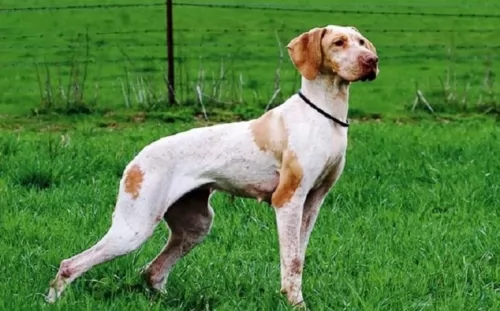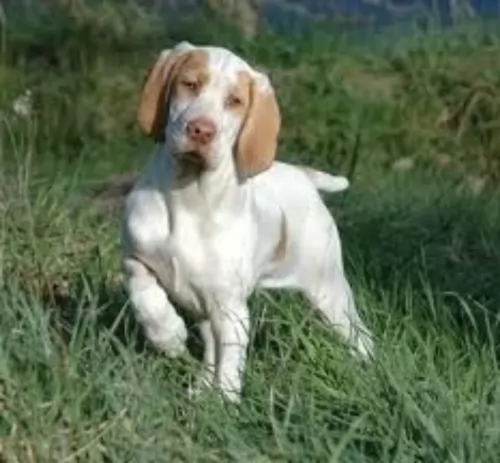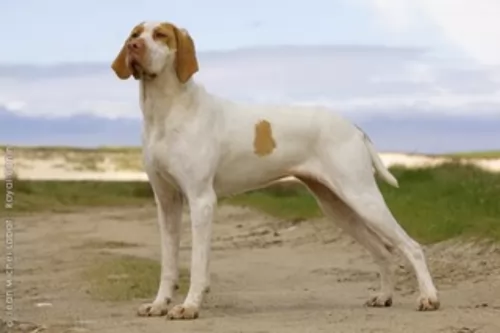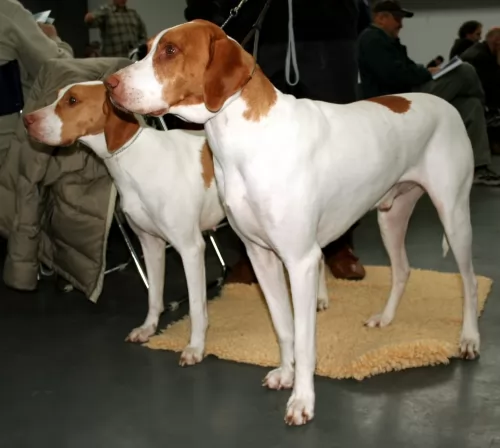 Petzlover
PetzloverAriege Pointer is originated from France but Pugnaces Britanniae is originated from United Kingdom. Ariege Pointer may grow 8 cm / 3 inches shorter than Pugnaces Britanniae. Ariege Pointer may weigh 80 kg / 176 pounds lesser than Pugnaces Britanniae. Both Ariege Pointer and Pugnaces Britanniae has same life span. Ariege Pointer may have less litter size than Pugnaces Britanniae. Both Ariege Pointer and Pugnaces Britanniae requires Low Maintenance.
 The Ariege Pointer is a French hunting dog, coming from the Ariegeois region of France.
The Ariege Pointer is a French hunting dog, coming from the Ariegeois region of France.
Known as the Ariege Pointing Dog, French Pointer or Braque de l’Ariege, these dogs came from the old French Braque dogs that were crossed with the orange and white Southern Braques.
It was in 1990 that a team of breeders decided to devote themselves to the breed’s survival. The Braque de l’Ariege was recognized by the United Kennel Club in 2006.
Pugnaces Britanniae is a dog which is now extinct. There isn't certainty surrounding the origins of the dog but it is thought they descended from dogs brought to Britain way back in the 6th century BC already.
These are ancient dogs, and when you do research you find references dating back to centuries ago. In fact when you read of the Roman conquest of Britain you read of huge dogs, which the Romans referred to as Pugnaces Britanniae.
It is believed that the English Mastiff descended from the ancient Alaunt and Pugnaces Britanniae and that the dog was used as a war dog.
 The Ariege Pointer has always been a dog kept essentially for hunting and not as a companion dog. He stands between 55 – 67cm and weighs 25 – 30kg.
The Ariege Pointer has always been a dog kept essentially for hunting and not as a companion dog. He stands between 55 – 67cm and weighs 25 – 30kg.
He is an attractive looking dog with quite a large head while the body is sleek and slender to look at. The ears are quite large and are floppy while the tail is traditionally docked to give him that distinctive look. These days the tail is often left long and hangs downwards.
The coat is short, single and rough and is white with tan or orange patches. The coat can also be speckled or ticked.
The Ariege Pointer is a hunting dog who is friendly towards strangers and therefore won’t make a particularly good watchdog.
These dog are lively, independent and good natured and they make excellent companion dogs. They are fairly docile and and get on well with children and pets in the home. Just like with any other dog, they need to be trained and socialized early.
The Pugnaces Britanniae was a huge dog standing at roughly 67 to 75cm and weighing 52 to 110kg.
He was a heavily built dog, a Mastiff type dog that had a large head, broad muzzle with fairly loose skin around the mouth, brown eyes, a broad back and rump, muscular legs and floppy ears with a long tail. In fact the Mastiff, thought to have descended from the ancient Alaunt and Pugnaces Britanniae, gives you an idea of what the dog looked like. He no doubt has a short, smooth coat available in fawn, tan or brindle and with the black mask.
The Pugnaces Britannia was a naturally aggressive dog so it is to be expected that he wouldn’t automatically have been a good family dog, possibly being aggressive around children and other dogs. They were intelligent and were no doubt taught some simple commands.
They were also very territorial dogs, wanting to instinctively chase and attack unknown people and animals. They were strong minded, confident, loyal ad loving dogs towards their owners, being protective of them, wanting to please them.
 The Ariege Pointer has always been an excellent pointing- and hunting dog. When it comes to being a family pet, he puts his hunting skills aside and becomes a loyal, loving, friendly pet.
The Ariege Pointer has always been an excellent pointing- and hunting dog. When it comes to being a family pet, he puts his hunting skills aside and becomes a loyal, loving, friendly pet.
They are considered to be rare dogs, and were at one time bordering on extinction. Those who have owned one of these hunting dogs will be glad to know that they are no longer considered endangered. They’re not your friendly, social kind of dog that you find in other dog breeds, but with training and socialization he will make a fine companion and family friend.
The Pugnaces Britanniae may well have been a large dog and quite imposing to look at but he was in all likelihood a good-natured pet who got on well with his family members, being loyal and loving if brought up correctly.
Long ago dog training and socialization didn’t exist but a large dog like this would have to be socialized and trained to become obedient and an amicable all-rounder.
 The Ariege Pointer is a working dog breed, used for hunting and retrieving prey. With good care the dog can live to be a good 12 – 15 years of age.
The Ariege Pointer is a working dog breed, used for hunting and retrieving prey. With good care the dog can live to be a good 12 – 15 years of age.
However, with every dog breed there are common dog diseases to watch for. This dog has long floppy ears and these can get damp and will need to be cleaned and dried regularly otherwise the long ears can be prone to infection.
Apart from being prone to health issues such as an ear infection, you want to be aware of very common dog ailments such as hip dysplasia which can cause lameness in your dog.
Whatever illness your dog has, and you see he isn’t acting his usual self, get him to the vet for a check-up and then make sure that all treatment and medication prescribed is adhered to.
The Pugnaces Britanniae could live to 10, 11 or 12 years of age with good care. Large Mastiff type dogs like this would have had to watch out for common canine diseases such as hip dysplasia, cancer and bloat.
In those days, no screening tests were available for health problems like this. Gastric dilatation volvulus or bloat is a common health issue with large, deep chested dogs where the stomach fills with gas and the stomach twists. Its a life threatening disease.
Canine heart disease is another serious health issue with these mastiff type dogs. Early stages with heart disease show there may well be no symptoms at all. However, as the heart disease progresses towards congestive heart failure, the dog will have symptoms such as fatigue, difficulty with breathing, weight loss, a distended abdomen and coughing.
A dog with symptoms like this would have to see a vet immediately.
 Your attractive Ariege Pointer will give birth to 2 – 8 puppies. If you don’t want puppies, then spaying or neutering is excellent and can actually have many health benefits for your pet.
Your attractive Ariege Pointer will give birth to 2 – 8 puppies. If you don’t want puppies, then spaying or neutering is excellent and can actually have many health benefits for your pet.
This dog with its short coat requires very little maintenance, and a good brush twice a week will ensure the coat remains glossy and shiny, giving you the chance to also check for fleas and ticks.
Don’t just assume every dog has bad breath. Bad breath can be indicative of dental disease, and dental problems can cause all kinds of other illnesses within the body. Make sure that while your pet’s teeth are healthy, that you brush them 2 or 3 times a week with special canine toothbrush and toothpaste.
The Ariege Pointer requires regular exercise as it is a lively, energetic dog. He can adapt to life in the city or the country, but ideally he needs a place with a large garden.
Wherever you keep him as a pet, make sure you take him for walks every day and that you play ball- or rope games with him. Ignoring his exercise needs will turn him into a bored, frustrated pet, and that isn’t fair towards him.
Make sure you choose good quality commercially manufactured foods for him. Adding in some home-made food to his kibble such as cooked brown rice, vegetables and chicken will be wonderfully good for him.
Every dog will require some raw meat added into his diet from time to time. Many skin diseases can be treated by adding in raw meat. After all, before dogs were domesticated they lived on raw meat, and including this ingredient back into their diet guarantees to make a remarkable difference in terms of good health.
The diets of ancient dogs were different to what they are today, as in those days there were no commercially manufactured dog foods. Dog owners in all likelihood tossed scraps to them which included starch.
Today a large dog such as the extinct Pugnaces Britannia would have no doubt been fed a high quality kibble from a leading brand and packed with minerals and vitamins specially formulated for a large dog breed.
Homemade food is also important, but not any kind of food – it has to be food which doesn’t upset the dog’s digestive system. Simple but nutritious food such as boiled chicken, brown rice or pasta, sweet potatoes, carrots and spinach is ideal for a dog, and when it is chopped up can be added twice a week to the dry kibble for a tasty, healthy treat.
Raw meat added in occasionally is also hugely beneficial. No dog should ever be without fresh, cool water constantly available.
As a short haired dog, the Pugnaces Britanniae would have required a brushing twice a week to rid the dog of loose hairs. Maybe in those days they didn’t check their dogs over to see that all was well, but today you would need to check the inside of the ears. If the insides were red, it could be a sign of an ear infection brought on by dampness, excess wax and dirt.
The eyes would need to be checked for discharge and the teeth checked a well. One rotten tooth can cause a lot of havoc. The nails of the dog would have had to be checked and clipped as well.
As a war dog, the Pugnaces Britanniae would have been fit. He is a big dog and while they require exercise such as walks and hide-and-seek type of games, he isn’t the kind of dog that would go running with you on a jog, as large, heavy dogs can overheat easily.